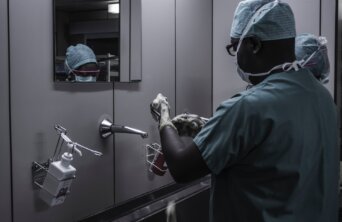- About
- Topics
- Picks
- Audio
- Story
- In-Depth
- Opinion
- News
- Donate
- Signup for our newsletterOur Editors' Best Picks.Send
Read, Debate: Engage.
| topic: | Health and Sanitation |
|---|---|
| located: | Nigeria, India, Germany |
| editor: | Bob Koigi |
In a region that has long grappled with the burden of Non-Communicable Diseases (NCDs) such as diabetes, cardiovascular ailments, and cancer, the announcement of the upcoming launch of the first-ever stem cell research laboratory in Sub-Saharan Africa carries profound significance. This development is not only historic in terms of advancing treatment and prevention methods for these diseases but also represents a significant stride in the region's commitment to vaccine and drug development. It also holds promise for fostering greater collaborations within the medical field and reinforcing existing research efforts.
The establishment of the cell and regenerative therapy center in Kenya arrives at a critical juncture when developing nations are confronted with an escalating burden of non-communicable diseases (NCDs). These ailments have had a substantial impact on patients, caregivers, and economies.
According to the World Health Organization, NCDs account for 37 per cent of deaths in Africa, highlighting the urgent need for improved prevention, diagnosis and care strategies to address this challenge effectively.
The WHO further notes the impact of non-communicable diseases (NCDs) is particularly pronounced in seven African countries, primarily small island nations, where as many as 88 per cent of deaths are attributed to these diseases. Additionally, in seven other countries within Africa, the majority of which are highly populous, NCDs claim up to 450,000 lives annually.
That burden is projected to keep rising, with the number of people living with diabetes in Africa estimated to reach 47 million by 2045 = up from 19 million recorded in 2019.
In Kenya, over 50 per cent of in-patient hospital admissions and 39 per cent of yearly deaths are attributed to NCDs.
All the while, the healthcare sector in Sub-Saharan Africa has faced significant challenges due to inadequate medical infrastructure, a shortage of healthcare personnel, weak implementation of health policies and rampant corruption. These factors have severely impacted the quality and accessibility of healthcare services in the region. As a result, patients have often resorted to seeking specialised treatment outside the continent in countries like Germany and India,
But access to affordable and adequate healthcare is universally recognised as a fundamental human right. In this context, the establishment of the stem cell lab represents a commendable step towards promoting early detection and treatment of diseases, while also fostering information sharing and collaboration in the field of stem cell and regenerative medicine.
To ensure affordable access to healthcare, particularly in the face of the escalating burden of non-communicable diseases, governments should prioritise budgetary allocations to the health sector. One suggested benchmark is the commitment to allocate at least 15 per cent of the national budget to the health sector, as envisioned in the Abuja Declaration.
But the war on NCDs cannot be won by governmental efforts alone. The the private sector must rise to the occasion and partner with local authorities in Africa to ensure universal access to affordable healthcare.
Image by Piron Guillaume.

